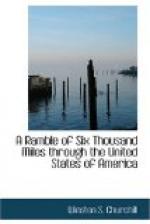CHAPTER II.
Having determined on quitting “the London of the States,” as my friends the Yankees call New York, I had bag and baggage conveyed on board a steamer bound for Albany. The arrangements and accommodations on board this boat were superb, and surpassed any thing of the kind I ever met with in Europe, on the same scale; and the groups of well-dressed passengers fully indicated the general prosperity of the country.
The distance between New York and Albany is about 165 miles. The scenery on the Hudson is said to be the most beautiful of any in America, and I believe cannot be surpassed in any country. Many of the beauties of rich European scenery are to be found along the banks of that noble river. In the highlands, about fifty miles from New York, is West Point, on which stands a strong fortress, containing an arsenal, a military-school, and a garrison. It is romantically situated among lofty crags and mountains, which rise above the level of the water from 1100 to 1500 feet. There are many handsome country seats and villages between West Point and Hudson, where the river is more than a mile wide.
After a passage of about sixteen or seventeen hours, we arrived at Albany. The charge for passage, including dinner and tea, was only three dollars; and the day following the cost was reduced, through the spirit of opposition, to one dollar.
Albany is the legislative capital of New York. It is a handsome city, and one of the oldest in the Union. Most of the houses are built of wood, which, when tastefully painted (not often the case) have rather a pleasing appearance. The situation of this city is advantageous, both from the direct communication which it enjoys with the Atlantic, by means of sloops and schooners, and the large tract of back country which it commands. A trade with Canada is established by means of the Erie and Hudson canal. The capitol, and other public buildings, are large and handsome, and being constructed of either brick or stone, give the city a respectable appearance.
Albany, in 1614, was first settled by the Dutch, and was by them called Orange. On its passing into the hands of the English, in 1664, its present name was given to it, in honour of the Duke of York. It was chartered in 1686.




